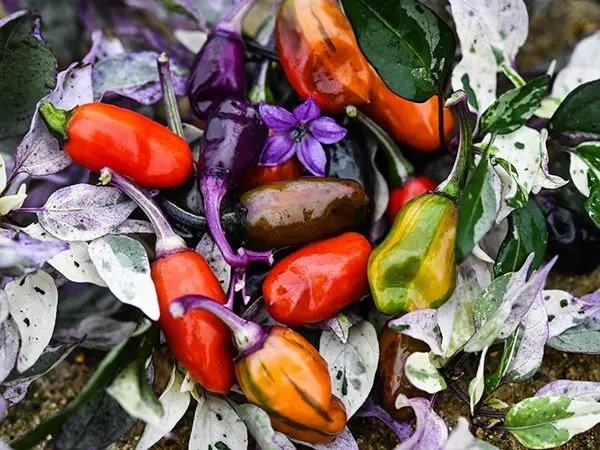Pepper Plant Pro Tips
The spicy and beautiful Jigsaw Pepper
Growing crazy, rare pepper plants can be a rewarding experience for any home gardener — but it can also be challenging, especially if you are new to gardening. However, with the right resources, you can easily grow a bountiful harvest of delicious peppers in your own backyard.
Here are some tips and tricks from The Plant Guys to help you grow better pepper plants in your home garden:
1. Choose the right location
Pepper plants require at least six hours of direct sunlight each day, so choose a location in your garden that receives adequate sunlight. You should also make sure that the soil in the location you choose is well-drained, as pepper plants do not do well in soil that is waterlogged or constantly wet.
2. Prepare the soil
Pepper plants thrive in soil that is rich in nutrients, so it is important to prepare your soil before planting. Adding perlite or volcanic rock will increase drainage and improve the oxygen levels in your soil, creating an aerobic environment fit for beneficial bacteria and root-friendly fungi like mycorrhizae. Mix in some compost or other organic matter to improve the soil's nutrient content and ensure that your peppers have the best chance of growing. Our favorite line of organic inputs is from Down to Earth ; you can find their products at your local garden shop or on Amazon. Check them out at https://downtoearthfertilizer.com/
3. Choose the right variety
We have many different varieties of pepper plants to choose from, and each variety has its own unique flavor and heat level — whether you prefer a sweet Murasaki Purple or hot and yellow-y Lemon Spice Jalapeno. Follow your taste buds!
4. Plant at the right time
Pepper plants are best planted in the spring, after the danger of frost has passed. This is typically around Mother’s Day in Michigan. You can also store your plants indoors under an affordable grow light until the Michigan season is ripe for planting.
5. Water and fertilize regularly
Pepper plants require regular watering to stay healthy and produce a good harvest. Make sure to water your plants deeply when soil hardens, and more often if the weather is particularly hot or dry. You should also fertilize your plants regularly with a balanced fertilizer to ensure that they have all the nutrients they need to grow strong and healthy. Keep it organic if you want the highest possible nutrient content in your belly.
6. Control pests and diseases
Pepper plants can be susceptible to various attacks from common Michigan pests, such as spider mites, thrips, and aphids. Weekly maintenance sprays of organic compounds can help keep your babies clean and pest-free. Look for food-safe, organic pesticides like neem oil and azadirachtin, or make your own out of mint oils and cayenne. Never spray anything labeled strictly for ornamental plants on something you intend to eat!

